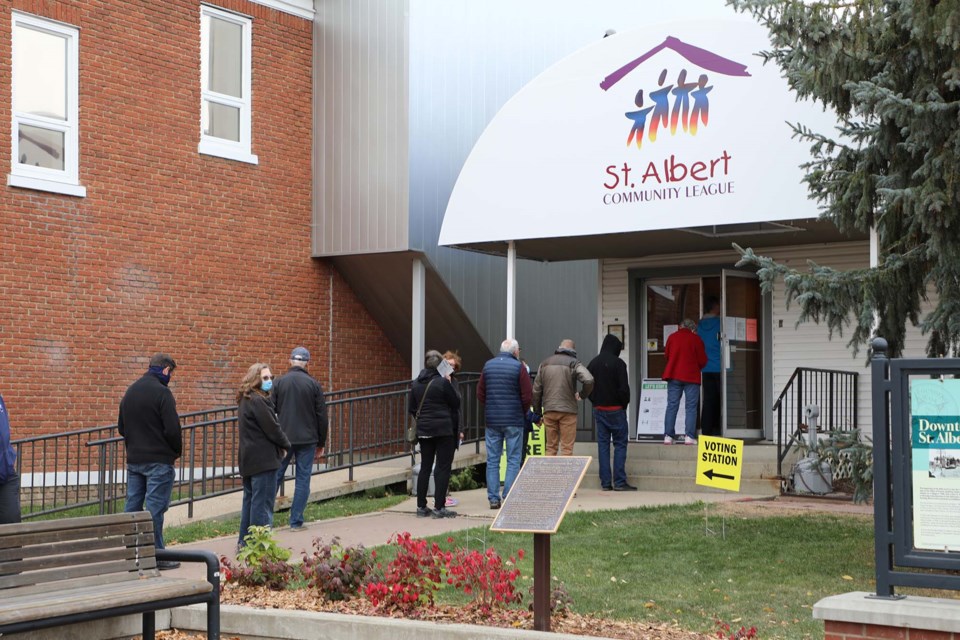On Oct. 18, St. Albertans will get to vote on whether or not the province should take action to remove equalization payments from the constitution.
The equalization question is the first referendum question and will look like this: "Should Section 36(2) of the Constitution Act, 1982 —Parliament and the government of Canada’s commitment to the principle of making equalization payments — be removed from the Constitution?"
A vote "yes" means an individual supports the removal of equalization payments from the Constitution.
A vote "no" means an individual supports keeping equalization payments as is.
But what exactly are equalization payments?
Clark Banack the interim director of Alberta Centre for Sustainable Rural Communities and an adjunct professor of political studies at the University of Alberta said he thinks there is quite a bit of misunderstanding around the program and what this referendum might lead to.
“The question itself is tapping in the ingrained idea in Alberta, that we are consistently mistreated by Ottawa, that we pay more than our fair share,” he said.
He spoke on Oct. 7 at a virtual forum about equalization payments, hosted by the U of A, called We Have to Vote Again? Unpacking the Municipal Elections and Provincial Referenda.
The principle of equalization is enshrined in the Constitution, Banack explained, and it is a commitment from our federal government that all Canadians have access to comparable education, health care, and other services regardless of where they live.
“Firstly, it's important to understand that the equalization program is just one part of a much larger and more complex system of fiscal federalism … Alberta does receive about $7 billion a year in broader social and health-care transfers from the federal government, but of course it does not receive equalization,” he said.
Equalization comes out of the general revenue of the federal government, he said. It’s the same pot of money the federal government uses to pay for other national programs, such as the military or National Parks services.
Banack said if you get into the “weeds” of the formula, it can be quite complex. However, the basics of the formula are quite simple.
“The purpose of the formula is to measure each province's ability to generate revenue from the taxes and natural resources that it has at its disposal — this is what we call its fiscal capacity,” he said.
This is done by assuming an average tax rate across all provinces.
“… If all provinces use that same tax rate, [the formula looks at] how much cash could they actually raise given the size and nature of the economy and that spits out a number. And that number is the province's fiscal capacity,” he explained.
The fiscal capacity calculation does not use actual tax revenues, but the average tax rate among the provinces. So, Alberta's per capita fiscal capacity is how much Alberta would have if everyone was taxed at an average rate.
Alberta’s tax levels are much lower than the average rate.
“It's important to understand, we're making a choice. We are choosing to have very low taxes compared to the average in the hope that resource royalties make up the rest, which they did in the early 2000s. They're not doing so for us now,” Banack said.
Despite recent hardships, Banack said, Alberta is the wealthiest province in terms of fiscal capacity.
“We still are the rich kids on the block, and by some margin,” he said.
Banack said it is true Albertans pay the highest in the country per capita in federal taxes, but not because the feds have it in for us.
“We’re far richer than the other provinces, our incomes are much higher, on average. All Canadians pay the same federal tax rate, we don't pay a higher one, because we're sitting here in Alberta,” he said.
Banack said he would love to ask critics of equalization to explain the alternative.
“Are they saying that Albertans should get to pay a lower federal tax rate than other Canadians? … more broadly, it's literally asking citizens of poor provinces to subsidize us, the rich kid on the block. Is that fair?” he asked.
He said the referendum question isn’t asking about tweaking the formula, however, it is asking if we want it removed.
“So, is the argument then that we just don't want to share? We just want to keep our wealth to ourselves?”
Banack said even if 85 per cent of people vote "yes" on this referendum question, it does not constitutionally mandate the federal government to suddenly come to the table and negotiate.
“This particular referendum is going to result in no change.”
Robin Mungall, who was in line at the advance polls on Oct. 6 at St. Albert Community Hall thinks Alberta has over paid, but he doesn’t think the province should try to get rid of equalization payments.
“They could have said we could get them to adjust it, but that’s not one of the choices on the ballot. I thought they would have more choices than that,” Mungall said.
He doesn’t think the vote on equalization is going to change a thing.
“It’s hardly worth it.”
James Hunter, who also stood in line at the advance polls, agreed.
“If the federal government is not interested, and they’re not clearly, then who cares,” he said.
Hunter said he doesn’t think equalization payments are a good set-up because there is no incentive built into the system for the have-not provinces to improve and become more responsible.
“The 'have' provinces, like us, have been taking a beating,” he said.



